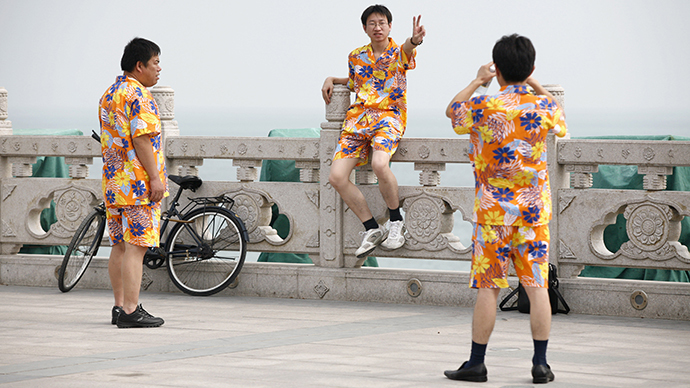‘Do not take plane life jacket with you’: China releases official rulebook for its tourists

China’s Communist Party has issued an official 64-page guidebook for the country’s holidaymakers after a spate of embarrassing incidents involving the Chinese abroad. Its advice ranges from the commonsensical to the downright odd.
Last year, mainland Chinese citizens made 83 million trips abroad – eight times more than in 2000 – during which they expended US$102 billion, leapfrogging the US and Germany to become the world’s biggest-spending tourist nation.
For many, these were first-ever trips. The most popular destinations for Chinese citizens are those that share few cultural similarities, such as France and the US.
In recent months, humiliating or offensive exploits of Chinese
tourists abroad have become a regular feature in local media,
such as the May story of a teenager who carved “Ding Jinhao
was here,” onto the wall of a 3,500 year-old temple in Luxor,
Egypt.
“They make loud noises in public, scratch graffiti on tourist
attractions, ignore red lights when crossing the road and spit
everywhere,” said Wang Yang, China’s vice premier, remarking
at the time that the latest wave of Chinese travelers “lack
quality and breeding.”
In past times, China’s Community Party offered only a single
sheet of advice, but as tourist behavior has become an official
image concern, a much longer illustrated guide has been produced.
It was published ahead of the Golden Week holiday, the annual
October celebration of the Communist takeover in China, which has
somewhat ironically become the preferred time for wealthier
citizens to travel to faraway bastions of capitalism.
Much of the information in the pamphlet is uncontroversial.
Chinese tourists are encouraged to use shower curtains in hotel
rooms, not to urinate in public pools, and to stop roping in
locals to take photos of their group.
A lot of the other advice presupposes a pattern of behavior that
may never have occurred to most tourists themselves.
Holidaymakers are told not to take life jackets kept underneath
plane seats because “if a dangerous situation arises then
someone else will not have a life jacket.” They are also
instructed not to leave footprints on toilet seats, and to avoid
drying handkerchiefs on lampshades in public places.
The crowning glory of the expanded guide are culture-specific
advice for popular destinations.
Some of it – such as not asking for pork in Muslim countries, or
calling black people ‘negroes’ – could potentially help Chinese
tourists to, at the very least, sidestep awkward situations.
But other tips seem strangely over-specific. When in Spain, women
should wear earrings at all times, or they will be considered
naked. In Scotland, tourists are told not to buy rocks as
souvenirs. And in Iran, visitors “must not comment on the eyes
of other people’s babies.”
The guide will be freely - and perhaps forcibly - distributed,
but at least one person is unconvinced that it will succeed in
changing habits overnight.
“That China is a lawless, poorly educated society with a lot
of money is going to take its toll on the whole world,” Hung
Huang, a well-known Beijing blogger and publisher, told The New
York Times.
“There’s an entire generation who learned you don’t pay attention
to grooming or manners because that’s considered bourgeois,”
she said.
"While Chinese are more open to Western ideas now, that has
not necessarily sunk in when actually interacting with the
outside world. “They think, ‘The hell with etiquette. As long as
I have money, foreigners will bow to my cash.’”














